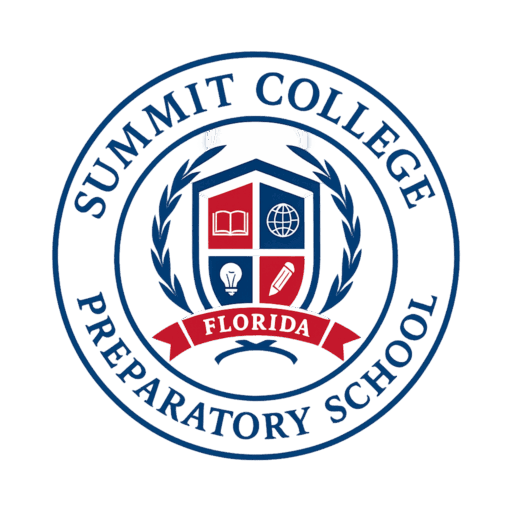AP English Language and Composition
Welcome to AP English Language and Composition at Summit College Preparatory. This AP-aligned course builds college-level rhetorical skills in nonfiction analysis, academic argument, and civic discourse. Students engage in purposeful reading, source-based writing, and evidence-driven reasoning in alignment with the College Board’s official Course and Exam Description (CED).
Course Overview
This rigorous, college-level English course is designed for 11th grade students who seek to develop advanced skills in rhetorical analysis, argumentation, synthesis, and evidence-based writing. Students read and analyze a wide range of nonfiction texts, including essays, journalism, political writing, speeches, memoirs, and visual texts. The course adheres to the official College Board AP English Language and Composition Course and Exam Description (CED) and prepares students for the AP Exam in May.
The course is structured over 34 instructional weeks and organized around the official nine-unit College Board framework, ensuring complete alignment and scaffolding of skills throughout the academic year. Students engage in daily writing, structured debates, source evaluation, and collaborative discussions. The curriculum fosters civic literacy, ethical argument, and clarity of expression in written and spoken formats. Instruction focuses on developing students' ability to read complex texts with understanding and to write prose of sufficient richness and complexity to communicate effectively.
College Board Units (9 Units)
| Unit | Title | Primary Skills | Example Texts |
|---|---|---|---|
| Unit 1 | Rhetorical Situation | Audience, purpose, context, exigence | Martin Luther King Jr., "Letter from Birmingham Jail"– masterful rhetorical appeals and historical urgency. |
| Unit 2 | Claims and Evidence | Thesis formulation, support with evidence | Barbara Ehrenreich, "Nickel and Dimed"– effective use of anecdotal and statistical evidence. |
| Unit 3 | Reasoning and Organization | Logical structure, transitions, commentary | Ta-Nehisi Coates, "Between the World and Me"– narrative structure blended with argumentative logic. |
| Unit 4 | Style | Diction, syntax, figurative language | David Foster Wallace essays– vivid language, complex syntax, and voice. |
| Unit 5 | Rhetorical Analysis Essay | Close reading, analysis, commentary | Speeches and editorials from U.S. history– varied rhetorical strategies across time periods. |
| Unit 6 | Argument Essay | Claim development, rebuttal, evidence | Editorials and essays on contemporary issues– diverse perspectives and complex claims. |
| Unit 7 | Synthesis Essay | Source integration, citation, evaluation | AP source sets and current events– practice combining multiple viewpoints into cohesive arguments. |
| Unit 8 | Research and Revision | Inquiry, source credibility, peer feedback | Extended research project and presentations– long-term inquiry and academic presentation. |
| Unit 9 | Spiraling Review and AP Exam Prep | Comprehensive review, test strategies, timed writing | College Board materials and released exams– simulate exam conditions and review key concepts. |
Learning Outcomes by Quarter (34 Weeks)
- Quarter 1 (Weeks 1–9): Explore rhetorical situations, annotate nonfiction texts, and write thesis-based paragraphs and rhetorical analysis responses (Units 1–2).
- Quarter 2 (Weeks 10–17): Deepen logical reasoning and style, write full rhetorical analysis essays, and assess tone and language choices (Units 3–4).
- Quarter 3 (Weeks 18–26): Develop argumentative essays, counterarguments, and complete timed argument prompts. Begin synthesis essay practice (Units 5–7).
- Quarter 4 (Weeks 27–34): Conduct research, finalize synthesis essays, participate in AP exam workshops, and engage in Unit 9 review spirals.
Instructional Methods
Instruction incorporates close reading protocols, rhetorical analysis models, peer editing, Socratic seminars, and synthesis workshops. Media literacy and argumentation using digital and print sources are emphasized. The course features frequent AP-aligned timed essays, student-led debates, and feedback cycles that promote college-level thinking and writing.
Assessment and Grading
| Category | Weight |
|---|---|
| AP Practice Essays (RA, ARG, SYN) | 35% |
| Quizzes and Multiple Choice | 25% |
| Projects and Presentations | 15% |
| Classwork & Discussions | 15% |
| Participation & Effort | 10% |
College Board – SAT/AP Crosswalk
| College Board Domain | AP English Integration |
|---|---|
| Command of Evidence | Developing claims, sourcing, citation |
| Words in Context | Vocabulary precision and rhetorical effect |
| Expression of Ideas | Logical structure, clarity, cohesion |
| Standard English Conventions | Grammar and sentence structure |
Academic Vocabulary Matrix
| Category | Key Terms | Use |
|---|---|---|
| Rhetoric | Ethos, Pathos, Logos | Analysis and persuasion |
| Argument | Claim, Counterclaim, Rebuttal | Essay development |
| Analysis | Diction, Syntax, Tone | Close reading and writing |
| Research | Credibility, MLA, Source Evaluation | Synthesis and extended inquiry |
